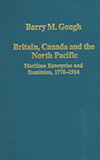Author's response
| Book: | Canada and the North Pacific. Maritime Enterprise and Dominion, 1778–1914Barry M. GoughAshgate ISBN: 086078939X, pp. xviii + 308, 2004 |
| Reviewer: | Jane Samson |
Dr Samson wishes to know if Gerald Graham's dismaying suggestion that the Pacific Ocean would not be a suitable subject for PhD dissertation research had been the reason for my lifelong work to give strength and support for the subject of my research. I am sorry to give an equally dismaying report that, no, that was not the case. But I had to prove to the great man that the project was worthwhile. Once on to the subject of the Royal Navy and the Pacific I had his every blessing and support and his avuncular guidance. He was very much a hands-on supervisor, as well as a powerful force in the History Faculty of the University of London. Yes, I found Harlow's book an inspiration. That subject – of the growth of empire, mainly oceanic (trade and naval bases) – had been very much ignored by historians, save for C. Northcote Parkinson and a few who had dabbled in Royal Navy history in British Columbia, notably F. Longstaff and W. Kaye Lamb, co-authors in a double article in the old British Columbia Historical Quarterly. (1) The Archivist of the Province of British Columbia, Willard Ireland, provided the basis for the theoretical work of my first book, based on my dissertation. (2) After that, and my preliminary trawl through all the Pacific Station records of the Royal Navy (noted by Dr Samson) it was a very big field before me.
I kept the introduction within the bounds of brevity required by my publisher, not wanting to take on the whole historical profession in a discursive discussion about History.
I should make clear that it was economic history, and more correctly, economic forces that I was first attracted to. This had been the subject of my MA thesis on British commercial pressure groups and the making of the Treaty of Paris, 1763. I still argue that commerce drives policy, and that profit and power are inextricably related. Thus my study of how the Royal Navy became the Wells Fargo of the sea, freighting silver bullion out of Mexican ports in the nineteenth century is a case in point. The same is true of my study of Meares Island, British Columbia, where sea otter traders and later timber interests changed the character of the islands and mainland, and with rapacious effect altered not only the landscape but more importantly the habitat of the aboriginal people. These are ongoing subjects of my research.
It could be that I have been driven to these various projects and sub-projects by the wealth of material that my preliminary survey uncovered. It has been a splendid tyranny. It is good that some of these articles and papers have been brought together between the covers of a book. There are no ghosts lurking on the outside of the margins of my work, only bright lights leading me forward through the arcane files of Admiralty, colonial, legal and anthropological files and other data.
Notes
1. C. Northcote Parkinson, War in the Eastern Seas, 1793–1815 (1954); F. V. Longstaff and W. Kaye Lamb, 'The Royal Navy on the Northwest Coast, 1813–1850', British Columbia Historical Quarterly, 9 (1945), 1–24, 113–28.
2. Willard E. Ireland, 'Pre-Confederation Defence Problems of the Pacific Colonies', Canadian Historical Association, Annual Report, 1941 (Toronto, 1941), 41–54.

